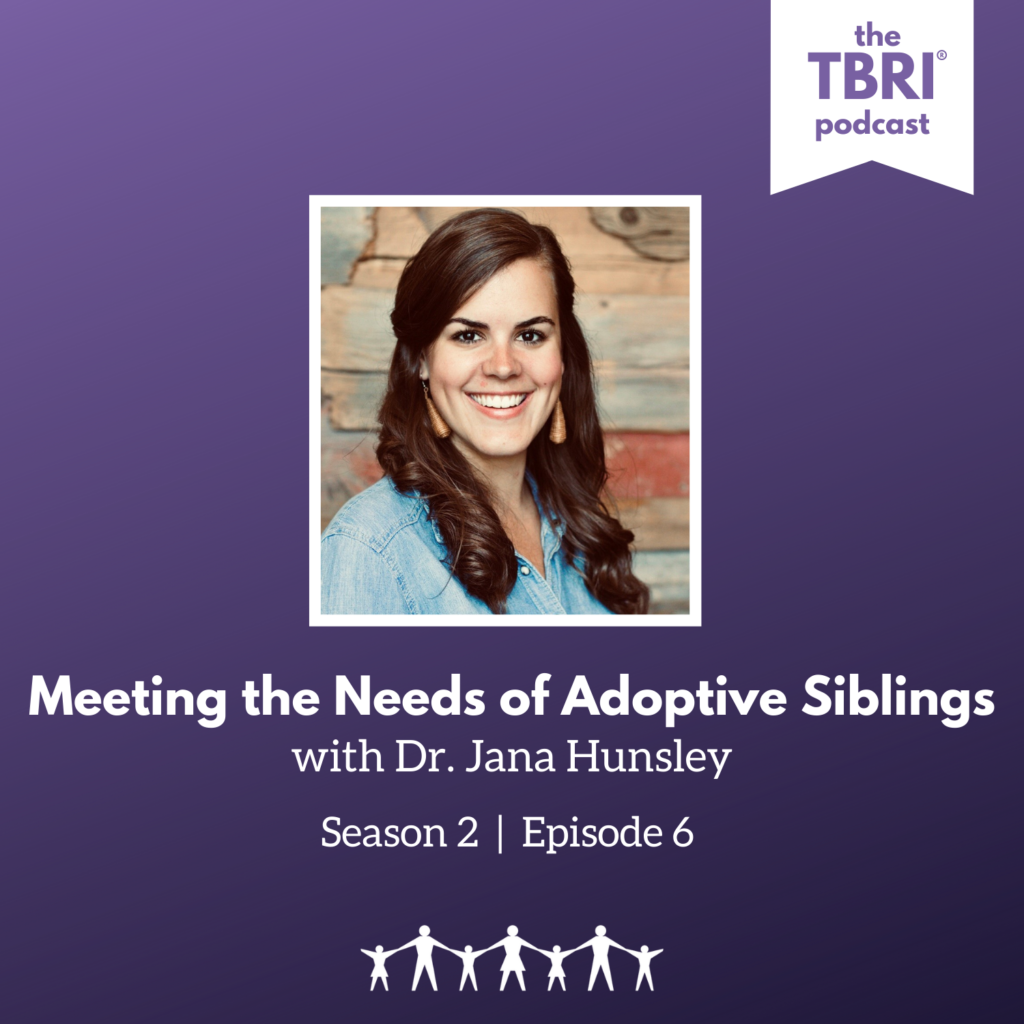The TBRI® Podcast | Season 2, Episode 6

Today we’re welcoming Dr. Jana Hunsley to the podcast! Dr. Hunsley is a Research Scientist at the Karyn Purvis Institute of Child Development. She recently completed her PhD in the Developmental Research lab through the Department of Psychology at TCU. In her research, Jana has recognized the importance of supporting the whole family system, rather than just focusing on the trauma-related needs of the adopted child, in order for lasting change to occur.
Apple Podcasts | Spotify
Or your favorite podcasting app!
Show Notes:
Linked References from this episode:
- Dr. Karyn Purvis
- Hope For the Journey Conference (previously known as the Empowered to Connect Conference)
- TBRI Practitioner Training
- Project 1025 – Dr. Hunsley’s website
About our guest:
Jana Hunsley is an experimental psychologist, licensed clinical social worker, TBRI Practitioner, and advocate for foster and adoptive families. Jana received her doctorate in experimental psychology from the Karyn Purvis Institute of Child Development at Texas Christian University where her research focused on understanding the needs of every member of adoptive and foster families and meeting their needs through developing post-adoption interventions. Prior to returning to school for her PhD, Jana worked as a post-adoption therapist. Over the years, she has worked in various settings with children and adolescents who have experienced trauma, including outpatient counseling, in-home counseling, residential treatment facilities, institutional care, school settings, the child welfare system, and juvenile detention centers. Jana’s passion for this work began as a teenager when her family adopted seven children internationally.
About the host:
Sarah Mercado is a Training Specialist with the Karyn Purvis Institute of Child Development (KPICD). As training specialist, Sarah’s main focus is instructing professionals working with children who have experienced trauma, in Trust-Based Relational Intervention® (TBRI®). TBRI®, a holistic, attachment-based, and trauma-informed intervention designed to meet the complex needs of vulnerable children, offers practical tools for caregivers to help those in their care reach their highest potential.
Sarah earned her Bachelor’s Degree from Sweet Briar College in Virginia. She began her career as a direct care staff working with adolescent boys living in a Residential Treatment Center (RTC). After serving in the RTC for several years, she shifted her focus to foster care, where she was Regional Director for a foster and adoption agency.
Sarah spent 20 years serving youth and families within residential and foster care settings as a direct-care worker and trainer before beginning her work with the Purvis Institute in May 2016. Sarah lives near Austin, TX with her husband, AJ, and their two children.
Thank you for your research on this important topic! My husband and I were shocked at how little information there was on this topic when we were in the process of adopting four siblings while also have four biological children of our own. I look forward to reading more information on your website, Dr. Hunsley!
Dear Jana,
Having sat in on your most helpful presentation, “The Connected Family: Understanding the Adoptive and Foster Family Dynamic” at the Illinois 2019 Replanted Conference, I was wondering if I could write to you about our incredible and ongoing journey in foster care and adoption since Helga (my wife) and I were certified in 2007?
We have three wonderful Christian, biological children over 20 years-old now and four adoptive children under 14, who all turned out to have profound and difficult disabilities with sad backgrounds. If anything, I have needed for a long time to reach out to someone like yourself who truly knows, cares and is concerned about the trauma and its effects on the biological children of adoptive families. I would simply like to tell my (our) story as you build your knowledge through the experience of others to enhance your much needed services.
We previously received training by participating in Karyn Purvis’ video presentations. But I do not know of anyone else that has the empathy which you have towards this area of life. Let me know at your convenience. Thank you kindly.
Craig Sidor (64 years-old)
Nora, IL
Lots of good information.
Very good information and insight given. Glad I chose to listen to this episode.
I have actually noticed behaviors in my bio kids since fostering that has caused a lot of frustration in our home! I’m so glad someone has finally addressed this
Good information glad I listened to this podcast
I went into this post cast w adoptive children’s birth siblings in mind never thinking about siblings in the home
All family members are affected by foster and adoption
Not only do the foster/adoptive/foster children need care the family as a whole needs care. Communication according to TBRI is communication every one in the family needs to be heard. the experiences of adoptive children are all different. When your focus is on the one child who requires more attention than the other siblings. It causes a disconnect within the entire family and can cause the children to be hurt without the parents realizing pain being experienced and felt throughout the family unit
Modeling openness within the famil unit is critical.
Very interesting we make sure that the siblings stay in contact with each other
Attachment and connection is a must for all relations.
I can understand what Dr. Huntley was talking about, we adopt a sibling group of boys . The attachment syndrome was unbelievable .